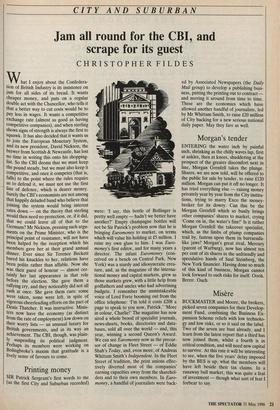Printing money
SIR Patrick Sergeant's first words to me (as the first City and Suburban recorded) were: 'I say, this bottle of Bollinger is pretty well empty — hadn't we better have another?' Empty champagne bottles will not be Sir Patrick's problem now that he is bringing Euromoney to market, on terms which will value his holding at £5 million. I raise my own glass to him. I was Euro- money's first editor, and for many years a director. The infant Euromoney (con- ceived on a bench on Central Park, New York) was a sturdy and idiosyncratic crea- ture, and, as the magazine of the interna- tional money and capital markets, grew as those markets grew, with a little help from godfathers and uncles who had advertising budgets. I remember the unmistakeable voice of Lord Forte booming out from the office telephone: 'I'm told it costs £208 a page to speak to you now, Patrick.' More in colour, Charlie!' The magazine has now sired a whole brood of specialist journals, news-sheets, books, directories and data- bases, sold all over the world — and, this year, winning a second Queen's Award. We can see Euromoney now as the precur- sor of change in Fleet Street — of Eddie Shah's Today, and, even more, of Andreas Whittam Smith's Independent. In the Fleet Street of tradition, the print unions effec- tively diverted most of the companies' earning capacities away from the sharehol- ders and to their own members. In Euro- money, a handful of journalists were back- ed by Associated Newspapers (the Daily Mail group) to develop a publishing busi- ness, putting the printing out to contract and moving it around from time to time. These are the economics which have allowed another handful of journalists, led by Mr Whittam Smith, to raise £20 million of City backing for a new serious national daily paper. May they fare as well.


























































 Previous page
Previous page